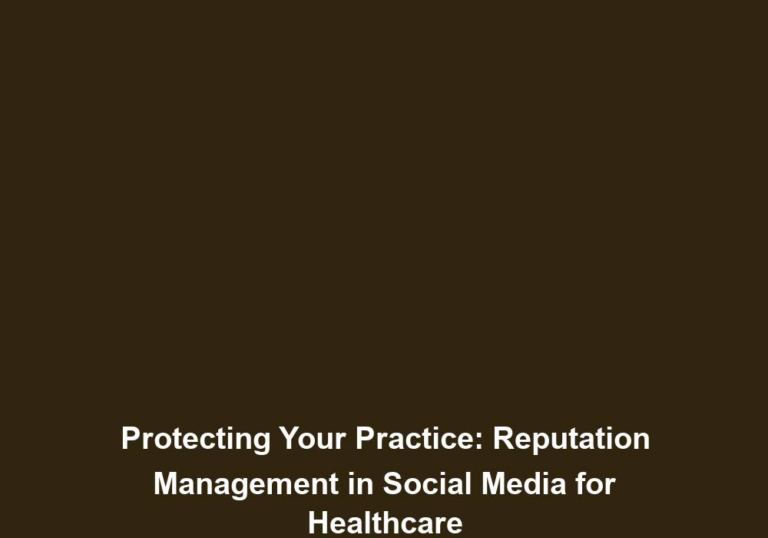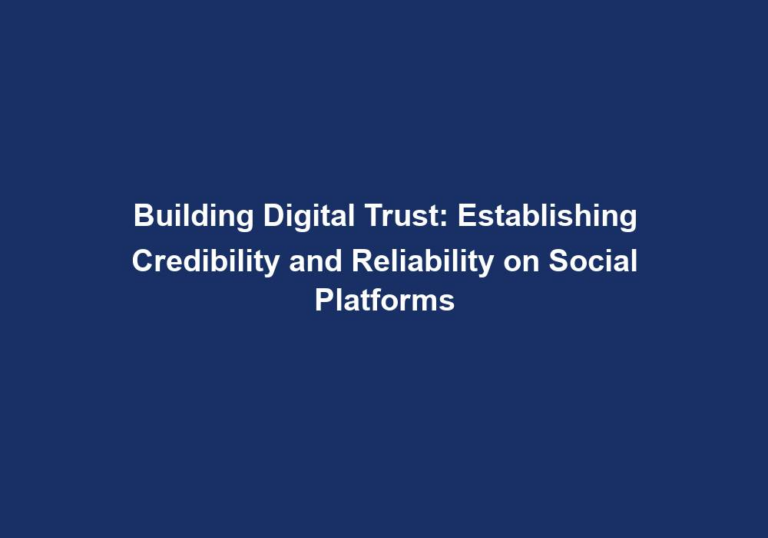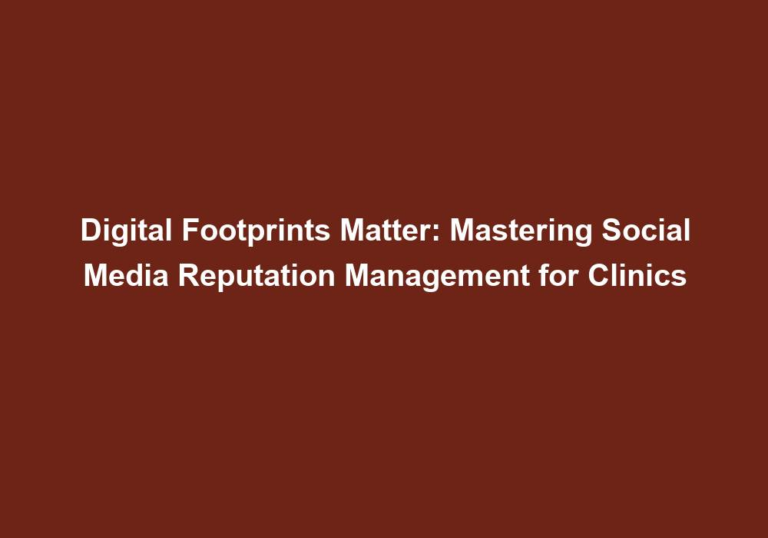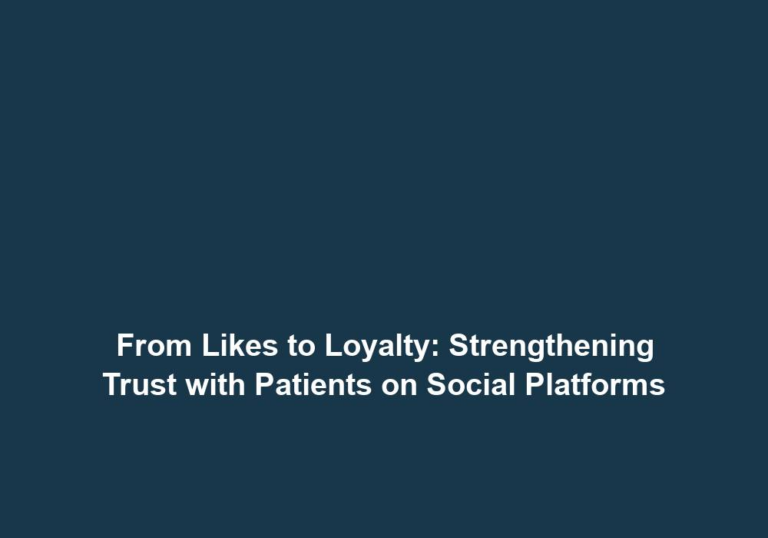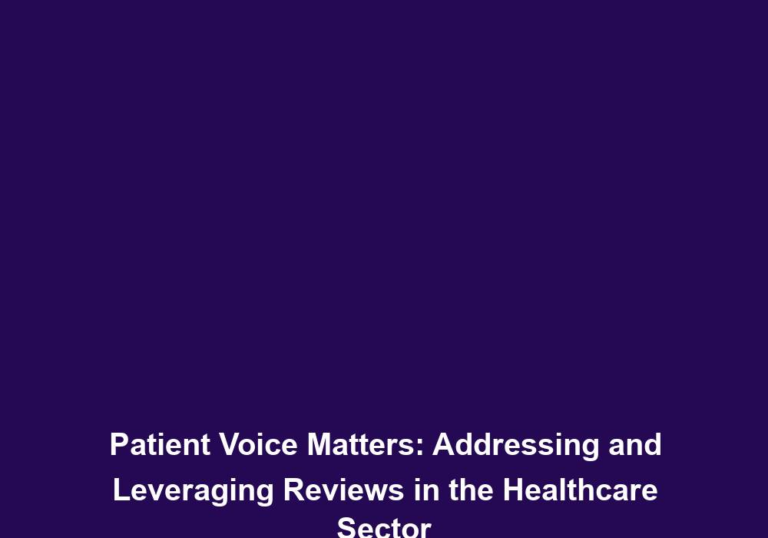Navigating the World of Patient Reviews: Best Practices for Addressing Feedback on Social Media
In today’s digital age, social media platforms have become an integral part of our lives. People use these platforms not only for connecting with friends and family but also for sharing their experiences, opinions, and feedback about various products and services. As a healthcare practitioner or provider, it is crucial to navigate the world of patient reviews and effectively address the feedback received on social media platforms. In this article, we will discuss some best practices to handle patient reviews on social media and maintain a positive online reputation.
The Importance of Online Reputation Management
Before diving into the strategies for addressing patient reviews on social media, let’s understand the importance of online reputation management.
- Visibility and Brand Perception: Social media platforms have a massive reach, and patients often turn to these platforms to share their experiences. Positive reviews can boost your visibility and enhance your brand perception, while negative reviews can harm your reputation.
Having a strong online presence allows potential patients to find you easily and gain confidence in your services. It is important to regularly monitor your online reputation to ensure that positive reviews are highlighted and negative reviews are addressed promptly and professionally. By actively managing your online reputation, you can influence the perception of your brand and attract more patients.
- Trust and Credibility: Online reviews play a significant role in building trust and credibility among potential patients. Positive reviews act as social proof, indicating the quality of your services, while negative reviews can raise doubts and deter potential patients.
When patients see positive reviews from other individuals who have had a positive experience with your practice, it instills trust and confidence in your services. On the other hand, negative reviews can have a detrimental impact on your reputation. By promptly responding to negative reviews and addressing the concerns raised, you can demonstrate your commitment to patient satisfaction and show potential patients that you value their feedback.
- Patient Satisfaction and Retention: Addressing patient feedback demonstrates your commitment to patient satisfaction. By actively engaging with patients on social media, you increase the chances of retaining existing patients and attracting new ones.
When patients feel that their concerns are being heard and addressed, it creates a sense of trust and loyalty towards your practice. By responding promptly and professionally to patient reviews, you show that you value their feedback and are dedicated to providing the best possible care. This can lead to increased patient satisfaction and improved patient retention rates.
Best Practices for Addressing Patient Reviews
Now that we understand the importance of online reputation management, let’s explore some best practices for addressing patient reviews on social media:
1. Monitor Your Online Presence
To effectively address patient reviews, it is essential to stay vigilant and regularly monitor your online presence. Set up Google Alerts, social media monitoring tools, and notifications to receive updates whenever your name, practice, or related keywords are mentioned online. By staying informed about what patients are saying, you can promptly respond and address their concerns.
Monitoring your online presence allows you to be proactive in managing your reputation. By being aware of what patients are saying about your practice, you can address any issues or negative feedback before they escalate. This also gives you an opportunity to identify trends or recurring concerns, which can help you make improvements to your services.
2. Respond Promptly and Professionally
Timely responses are crucial when it comes to addressing patient reviews on social media. Aim to respond to reviews within 24-48 hours to demonstrate your commitment to patient care. Craft professional and empathetic responses that acknowledge the patient’s feedback and address their concerns. Even if the review is negative, maintaining a polite and calm tone is essential.
Responding promptly shows that you value feedback and are actively engaged in addressing patient concerns. It reassures patients that their voices are being heard and that you are committed to providing them with the best possible care. By crafting professional and empathetic responses, you can help defuse any potential negative situations and turn them into positive experiences.
3. Personalize Your Responses
While it may be tempting to use pre-written responses, personalizing your replies shows that you genuinely care about each patient’s experience. Address the patient by name and reference specific details mentioned in their review to show that you have taken the time to understand their concerns. Personalized responses can have a significant impact on patient satisfaction and help foster a positive online reputation.
By personalizing your responses, you create a more meaningful connection with the patient. It shows that you are not simply providing a generic response but are genuinely interested in their specific situation. This personalized approach can make patients feel valued and appreciated, strengthening their trust and loyalty towards your practice.
4. Take the Conversation Offline
When dealing with a complex or sensitive issue raised in a patient review, it is advisable to take the conversation offline. Provide a contact number or email address for the patient to reach out to you directly. This approach allows for a more private and personalized interaction, where you can address their concerns in greater detail and find a suitable resolution.
Taking the conversation offline demonstrates your commitment to resolving the issue and providing a satisfactory solution. It also helps protect patient privacy and confidentiality, as sensitive matters should not be discussed publicly on social media platforms. By providing direct contact information, you invite the patient to engage in a one-on-one conversation, where you can better understand their concerns and work towards a resolution.
5. Encourage Positive Reviews
While negative reviews can be detrimental to your online reputation, encouraging positive reviews can help counterbalance them. After providing excellent service, politely ask satisfied patients to leave a review on your preferred social media platforms. Positive reviews not only boost your reputation but also act as valuable testimonials for potential patients.
Encouraging positive reviews is a proactive way to build a strong online reputation. Satisfied patients are often willing to share their positive experiences, and their reviews can serve as powerful endorsements for your practice. By politely asking for reviews, you create an opportunity to highlight the quality of your services and attract more patients to your practice.
6. Learn from Feedback and Implement Improvements
Patient reviews can provide valuable insights into areas where your practice can improve. Use constructive feedback as an opportunity to reflect on your processes, policies, and patient experiences. Implement relevant changes and communicate these improvements to patients. By actively listening to patient feedback, you can continuously enhance your services and foster a culture of patient-centered care.
Feedback from patients can help you identify areas of improvement that you may have overlooked. By actively listening to their concerns and suggestions, you can make meaningful changes that enhance the patient experience. Communicating these improvements to patients shows that you value their feedback and are committed to providing the best possible care.
7. Seek Professional Assistance if Needed
Managing your online reputation can be time-consuming and challenging, especially if you have a busy practice. Consider seeking professional assistance from digital marketing agencies or reputation management experts. These professionals can help optimize your online presence, monitor patient reviews, and devise strategies to address feedback effectively.
If you find it overwhelming to manage your online reputation on your own, seeking professional assistance can be beneficial. Digital marketing agencies and reputation management experts have the expertise and resources to help you navigate the complex world of patient reviews. They can develop strategies tailored to your practice, monitor your online presence, and provide guidance on addressing feedback in a professional and effective manner.
Conclusion
Effectively navigating the world of patient reviews on social media is essential for healthcare practitioners and providers. By monitoring your online presence, responding promptly and professionally, personalizing your responses, taking conversations offline when necessary, encouraging positive reviews, learning from feedback, and seeking professional assistance if needed, you can maintain a positive online reputation and build trust with your patients. Remember, addressing patient feedback on social media is an opportunity to demonstrate your commitment to patient care and continuously improve your services.


